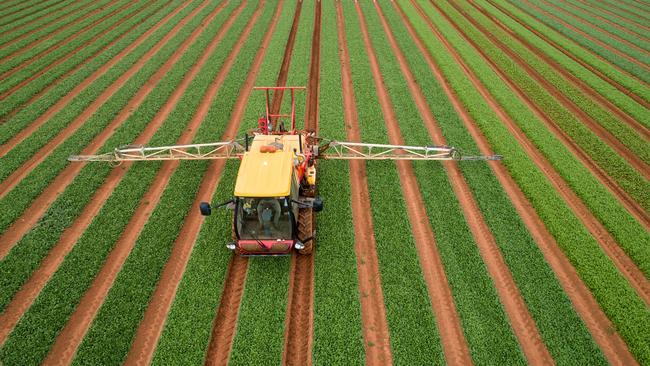Supermarkets under pressure, farmers ‘just fodder in price war’
Major retailers are in the spotlight for inadequate prices paid to farmers. This time it’s the fruit and veg industry calling foul.
Major supermarkets are coming under pressure to increase fresh fruit and vegetable prices as farmers begin to cry foul over payments that don’t cover their cost of production.
Industry groups and Agriculture Minister David Littleproud are working together to confront Australia’s three major retailers over the wholesale price they are paying for fresh produce, which they say is at historic lows.
Industry sources say apple growers are receiving about $150-$200 a bin that costs farmers $250 to grow, pear growers about $80 a bin that costs $60 just to have picked and stone fruit growers as little as $2-$2.20 a kilogram.
Meanwhile the price of celery has been stable for more than three years, despite the cost of some inputs – from fertiliser, chemicals, fuel, labour and in some cases airfares – having risen by 40 per cent.
One grower, who did not want to be named for fear of retribution from the supermarket they supplied, said it was competition between the retailers driving down prices.
“They match each other’s catalogues and use us as fodder for their price war. They would argue that growers were accepting the prices, but the problem is this is a perishable product and the grower needs to manage cash flow and stock on hand, so if he’s a supplier to one of the retailers he has to accept the price, there is no alternative,” he said.
“If you don’t, they will park you for a few weeks and give others the orders. So it’s a competition for orders, not the best prices.”

AGRICULTURE MINISTER STEPS IN
First it was $1 a litre milk, now Agriculture Minister David Littleproud was “stepping in” to fight for fruit and vegetable growers, who he said were not being paid a fair price.
Many within the industry said the issue had come to a head following weeks of soaring input costs.
Mr Littleproud said there was a power imbalance between the major retailers and fruit and vegetable growers, who were being coerced to make concessions because they lacked information on pricing and volume in the market.
He was calling for the introduction of a digital platform into which producers could input their own information and assess the cost of production, the amount of a commodity in the marketplace and prices being paid.
“That’s the first step. It takes the power imbalance away from the supermarkets,” Mr Littleproud said. “Farmers are just looking for fair prices and that should be reflected at the checkout … If they (retailers) don’t want to play nice, the government needs to step in.”
INFORMATION IS POWER
Supermarkets source fresh produce from hundreds of growers, who offer their “best price”, usually on a weekly basis. A grower’s price is either accepted or they are told another grower has undercut them. They can then match that price or count themselves out, leaving them with highly perishable product on their hands.
Peak grower bodies have been working to build a war chest of information to challenge the supermarkets’ practice of buying produce at unsustainably low prices.
Hort Innovation and Apple and Pear Australia had collected data to illustrate the changes in cost of production for apple and pear growers.
“We know the cost of production, and the price they’re receiving is well below it,” APAL head of government relations and advocacy Jeremy Griffith said. “And it’s not just apples and pears, it’s right across the board.”
AUSVEG head of advocacy Tyson Cattle said the time had come for retailers to up their prices.
“For growers to receive a fair price for their produce, prices must increase,” Mr Cattle said.
He said vegetable prices had experienced the lowest retail price percentage increase of all the agricultural commodities, at an average of just 7.5 per cent across potatoes, onions, carrots, lettuce, celery and broccoli.
“This is well below the average percentage of agricultural commodities of about 59.2 per cent, and also well below the average percentage increase of the input costs at a massive 110.3 per cent,” Mr Cattle said.
“These are alarming numbers and go to the heart of the supply chain issues within the fresh produce industry.”
He added many growers had contacted the organisation highlighting their frustration and the challenges they were facing to remain viable.

GROWERS PULLING OUT TREES
Nicholls MP Damien Drum said growers were in a delicate situation.
“We’ve got the most efficient orchardists leading the way but the purchase price they sell to the supermarket is still way under the cost of production,” Mr Drum said.
“They get offered a deal, some are tempted to suck it up and lose $10,000-$30,000 but at least they have a sale of fruit, rather than it drop on the ground and rot.”
Fruit Growers Victoria chair Mitchell McNabb said some growers had already started pulling out their trees.
“(Retail) margins were historically 40-60 per cent, now it’s about 100 per cent,” he said. “When they’re marking up so much and not paying the cost of production, it’s not right.”
Mr McNabb said the Agriculture Minister’s idea of a commodity portal with price and volume information would certainly help.
“Just the idea might be enough, so the retailers know they’re being monitored,” he said.
SUPERMARKETS REPLY
Coles maintained its prices were dictated by supply and demand.
A Coles spokeswoman said the retailer was committed to building strong, multigenerational partnerships with Australian farmers and producers.
“We appreciate that there are a number of factors driving inflation for all retailers, including increases in the cost of raw materials, energy price rises, freight costs, extreme weather events and ongoing Covid impacts,” she said.
A Woolworths spokeswoman said the supermarket engaged in collaborative conversations about price with its regular suppliers, taking into account cost pressures driven by inflation.
“At an aggregate level, we’re paying more for fruit and vegetables than this time last year.
“We’re always working to strike the right balance so suppliers receive a fair market price and our customers have access to high quality and affordable fresh produce,” she said.
“We’ll continue to work closely with our suppliers to understand variations in the market and collaboratively manage industry-wide challenges.”





